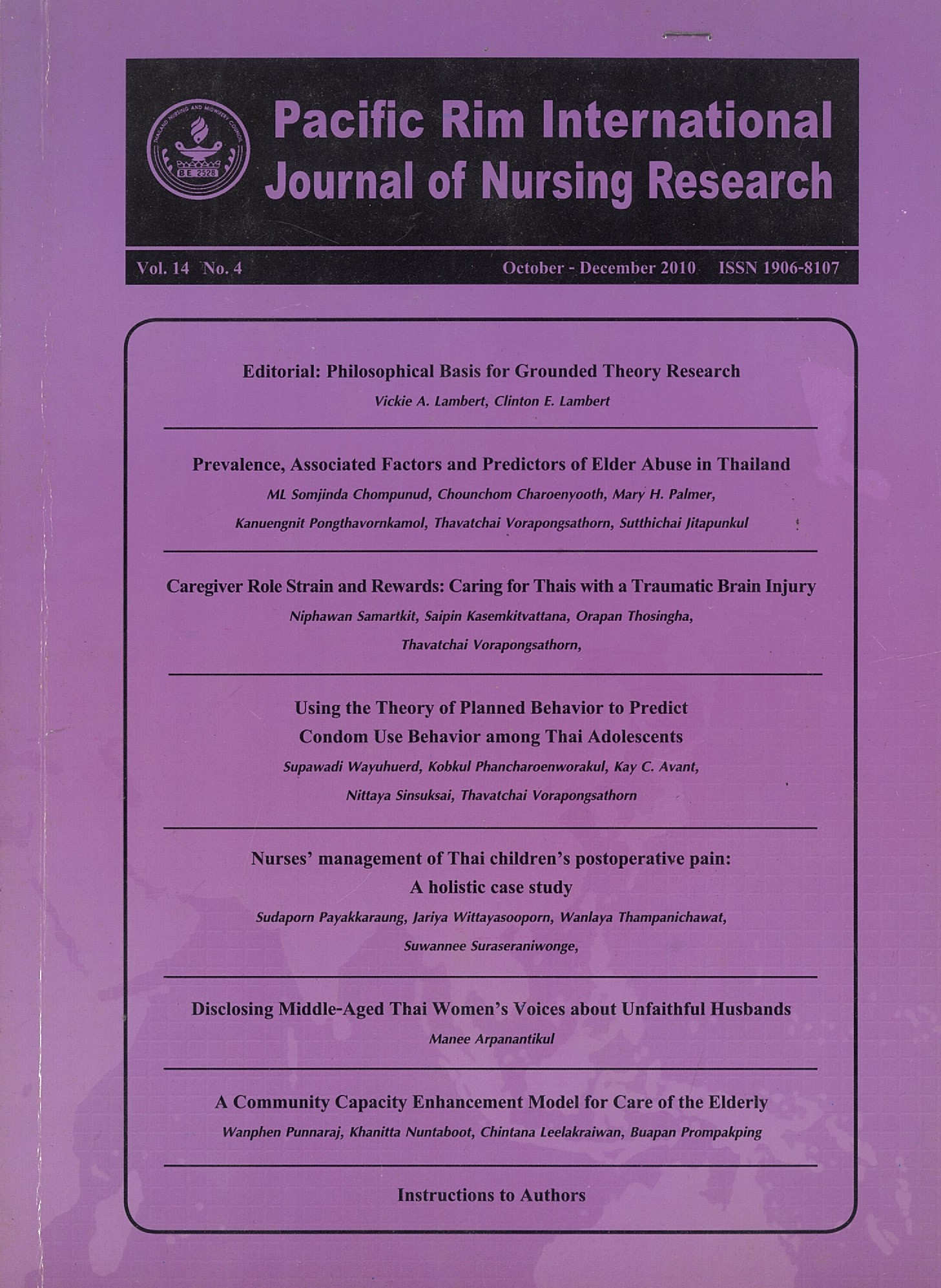A Community Capacity Enhancement Model for Care of the Elderly
Keywords:
ผู้สูงอายุไทย, รูปแบบการดูแลสุขภาพ, การดูแลสุขภาพชุมชน, ภาคีหุ้นส่วนชุมชน, Elderly Thais, Health Care Model, Community Care, Community PartnershipsAbstract
บทคัดย่อ
การวิจัยครั้งนี้ใช้กระบวนการวิจัยแบบมีส่วนร่วมโดยชุมชนเป็นฐาน ในชุมชนชนบทแห่งหนึ่งในภาคตะวันออกเฉียงเหนือของไทย โดยมีวัตถุประสงค์เพื่อหารูปแบบที่เหมาะสมในการดูแลผู้สูงอายุในชุมชน ใช้เวลาในการศึกษาในพื้นที่เป็นเวลา 12 เดือน ผู้เข้าร่วมวิจัยประกอบด้วยผู้ให้ข้อมูล ได้แก่ผู้สูงอายุ 140 คน สมาชิกครอบครัวผู้สูงอายุ 20 คน ผู้นำชุมชน 11 คน พยาบาลวิชาชีพประจำศูนย์สุขภาพชุมชน 5 คน อาสาสมัครสาธารณสุข 10 คน และบุคลากรองค์กรปกครองส่วนท้องถิ่น 5 คนการศึกษาวิจัยแบ่งเป็น 2 ระยะ การวิจัยระยะที่ 1 เป็นระยะการวิเคราะห์สถานการณ์ความต้องการการดูแลของผู้สูงอายุ เก็บรวบรวมข้อมูลโดยการประเมินความสามารถในการปฏิบัติกิจวัตรประจำวัน (Barthel ADLIndex) การสัมภาษณ์เชิงลึก การสังเกตแบบมีส่วนร่วม การสนทนากลุ่ม การวิจัยระยะที่ 2 เป็นการประชุมระดมสมองเพื่อพัฒนารูปแบบการดูแลผู้สูงอายุที่เหมาะสมกับบริบทของชุมชน การวิเคราะห์ข้อมูลเชิงปริมาณนำมาวิเคราะห์ทางสถิติเป็นความถี่และร้อยละ ข้อมูลเชิงคุณภาพนำมาวิเคราะห์เชิงเนื้อหา
ผลการวิจัยสามารถแบ่งกลุ่มผู้สูงอายุได้ 4 กลุ่ม คือ ผู้สูงอายุที่สามารถช่วยเหลือตัวเองได้ ผู้สูงอายุที่ช่วยเหลือตัวเองได้บางอย่างและต้องพึ่งพาผู้อื่นบางอย่าง ผู้สูงอายุที่ช่วยเหลือตัวเองไม่ได้ และผู้สูงอายุที่ถูกทอดทิ้งไม่มีผู้ดูแล ด้านปัญหาและความต้องการดูแล ประกอบด้วยการต้องการการดูแลเมื่อเจ็บป่วย ต้องการความมั่นคงด้านการเงิน ต้องการอยู่ในครอบครัวกับลูกหลาน และต้องการการยอมรับจากชุมชน สำหรับข้อเสนอรูปแบบที่เหมาะสมในการดูแลผู้สูงอายุในชุมชนประกอบด้วย 1) การดูแลในลักษณะของภาคีหุ้นส่วนของผู้ที่มีส่วนเกี่ยวข้องในลักษณะของความสัมพันธ์ในแนวราบ 2) อยู่บนฐานของทรัพยากรและศักยภาพของชุมชน 3) การดูแลนี้จะมีส่วนในการสร้างความเข้มแข็งของชุมชนที่สอดคล้องกับบริบทสังคมและวัฒนธรรมของชุมชน และ 4) ครอบครัวและชุมชนเป็นสถาบันหลักในการให้การดูแลผู้สูงอายุ โดยการสนับสนุนช่วยเหลือของศูนย์สุขภาพชุมชน องค์ปกครองส่วนท้องถิ่นและภาคีเครือข่ายที่เกี่ยวข้อง โดยรูปแบบการดูแลที่เหมาะสมประกอบด้วย 1) มีระบบสนับสนุนดูแลช่วยเหลือผู้สูงอายุให้สามารถช่วยเหลือตัวเองได้ 2) ส่งเสริมและสนับสนุนให้ผู้สูงอายุได้อยู่ในครอบครัวกับลูกหลาน และ 3) ดำเนินการให้มีการจัดตั้งชมรมผู้สูงอายุและกองทุนชุมชน เพื่อให้เป็นสวัสดิการในการให้การดูแลช่วยเหลือด้านการเงินและสุขภาพสำหรับผู้สูงอายุ
คำสำคัญ : ผู้สูงอายุไทย; รูปแบบการดูแลสุขภาพ; การดูแลสุขภาพชุมชน; ภาคีหุ้นส่วนชุมชน
Abstract
This two-phased, community-based, participatory action research sought todevelop a community health care model for providing care for elderly northeastern Thais.Participants included, over a 12 month period, 140 elders (60 years and older), 20 elders’family members, 11 community leaders, 5 nurses, 10 health care volunteers and 5 localgovernment officials from a community in northeastern Thailand. Phase I involved datagathering, via interview, participatory observation, focus groups and review of relateddocuments, regarding the needs of the elderly. Development of an appropriate communityhealth care model for the elderly occurred in Phase II, and represented the ideas,procedures, constraints and roles of all participants involved in data generation duringPhase I.
Data regarding the elders’ abilities to perform activities of daily living were obtainedvia the Barthel ADL index, participant observation, in-depth interviews and focus groupdiscussions. Descriptive statistics were used to analyze the quantitative data, while contentanalysis was performed on the qualitative data.
Findings revealed the elders could be categorized as either: independent; semiindependentor dependent. Elders were found to have difficulties performing activities ofdaily living when without illnesses, as well as when ill. In addition, most of them expresseda: need for financial stability; desire to stay with family members, including children andgrandchildren; and, chance to be part of the community.
The proposed Community Capacity Model for providing care for the elderly wasfound to: be a workable partnership model with horizontal relationships; be based on theresources and capabilities of the community; reinforce community involvement within thesocial and cultural context; and, focus on the role of family and community as main entitiesfor providing care, for elders, through support of the local health care unit andadministration, and the community and family network. Thus, the model was seen as:supportive of elders; encouraging of elders staying with family and maintaining health assemi-independent community members; and, encouraging establishment of seniorassociations and financial cooperatives to provide assistance in the care and welfare ofelders.
Key Words: Elderly Thais; Health Care Model; Community Care; Community Partnerships
Downloads
How to Cite
Issue
Section
License
Copyright: The Pacific Rim International Journal of Nursing Research, Thailand Nursing & Midwifery Council has exclusive rights to publish, reproduce and distribute the manuscript and all contents therein.








.png)



